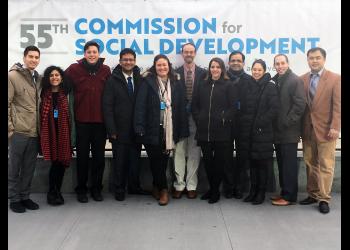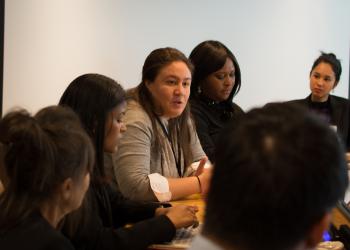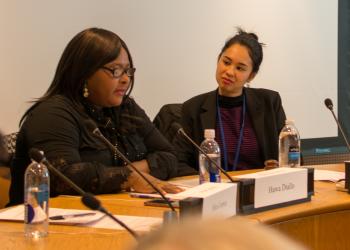Seeing the capacity for meaningful contribution in all populations and people
At the 55th UN Commission for Social Development, Baha'i participants stress recognizing our mutual interdependence
In an interconnected world, there are risks to segmenting societies based on superficial categories. While the UN and other international development agencies often apply labels – such as “marginalized” or “youth” – to various groups of people in an effort to help them, this practice can have unintended consequences.
Although labels may be useful for data collection, and to ensure an accurate reading of trends, if taken too far they can disempower those to whom the classification has been applied and diminish the important contributions they make to society.
Policies to help someone with disabilities, for example, often create an image of one population helping another – giving charity. Whereas people with disabilities have helped society advance in a multitude of ways.
Or, in the case of “youth,” such a classification can reduce them to a “strategic category” that is “simply a huge conglomeration of needs and problems.”
That was the observation of Bita Correa, a member of the Baha'i International Community’s delegation to the 55th UN Commission for Social Development, held this month in New York.
However, said Ms. Correa, “when they are not seen as an outside group or an arbitrary category,” young people can play “essential and pivotal roles” in their communities.
The idea that the categorization of various groups can have the unintended effect of disempowering them ran through many of the contributions of the Baha'i International Community (BIC) to the Commission this year, which had as its priority theme “Strategies for eradicating poverty to achieve sustainable development for all.”
The BIC statement to the Commission, for example, sought to address that theme directly, noting that although poverty eradication has been a goal of the UN for decades, “lasting solutions have been elusive.”
What may be needed, the BIC said, is for the UN to shift from a mindset focused on scarcity to one that emphasizes untapped prosperity by looking first to the capacity of people at the grassroots to become agents of their own development.
Titled “From Deficit to Abundance: Seeing Capacity for Meaningful Contribution in all Populations and People,” the statement noted that while international aid agencies increasingly acknowledge the “agency of low-income communities,” the people in them are “rarely embraced as capable and equal partners in a collaborative enterprise.”
In that context, it is “vital for the United Nations system to develop its ability to see capacity and strength in populations that, at times, may have been given labels such as ‘marginalized,’” said the statement.
The members of the BIC delegation to the Commission also participated in a number of events and side events at the meeting, often offering similar insights.
Daniel Perell, a representative of the Baha'i International Community to the United Nations, addressed the Commission in its opening session as chairperson of the NGO Committee for Social Development.
He said it was important not to segment the world into “developed” and “undeveloped” but rather to recognize a universal agenda where we acknowledge that “no segment of society already has what is needed to bring about the world we collectively desire for ourselves and our children.
“Whether wealthy or poor, rural or urban, a doctorate or illiterate, we all depend on each other and we all have much to learn about a functioning society,” said Mr. Perell.
“This might be challenging to some, and runs counter to certain ideologies,” he continued. “But interdependence, as expressed through relationships of mutual support and assistance, will increasingly be seen as the source of our greatest strength.”
Ms. Correa’s remarks about youth came on Friday, 3 February, at a side event organized by the BIC on the topic “Rising Generations: Youth as Drivers of Prospering Communities.” [Video link]
Ms. Correa, program director FUNDAEC (Fundación para la Aplicación y Enseñanza de las Ciencias), a Baha'i-inspired agency in Colombia, spoke about the experience of a group of young people on the north coast of Colombia who undertook a service project to promote better practices in solid waste disposal – an effort that ended up transforming the habits of their entire community.
The young people had been engaged in program of study that emphasized their own agency, stressed the importance of learning together, and encouraged projects of service to the whole community. They decided to focus on environmental issues, and, over a period of about six months, they analyzed the patterns of consumption in the community – noting also how solid waste was disposed.
“It became apparent that trash was being left on the street or being dumped in the river,” said Ms. Correa.
So the youth organized a series of clean-up days in the community. They bought trash cans and placed them strategically. They also visited families and shared what they had learned about composting and recycling.
Ultimately, said Ms. Correa, the community essentially re-organized its entire approach to solid waste disposal, thanks to the initiative of young people.
“One thing we have observed in the various programs that are being offered in the Baha'i community worldwide has been the willingness and energy which with youth have participated when given the chance,” she said. “They want to engage and participate. They want to see that their actions actually have an impact.”





